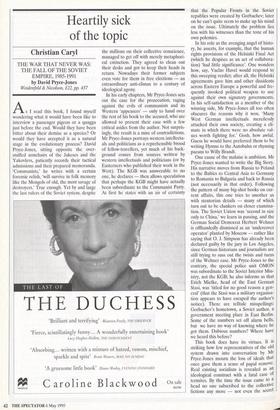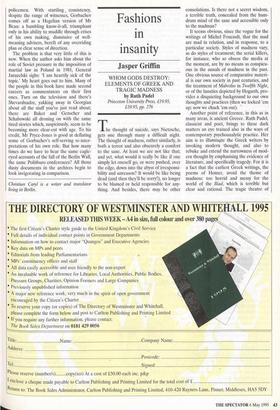Heartily sick of the topic
Christian Caryl
THE WAR THAT NEVER WAS: THE FALL OF THE SOVIET EMPIRE, 1985-1991 by David Pryce-Jones Weidenfeld & Nicolson, £22, pp. 437 As I read this book, I found myself wondering what it would have been like to interview a passenger pigeon or a quagga just before the end. Would they have been bitter about their demise as a species? Or would they have accepted it as a natural stage in the evolutionary process? David Pryce-Jones, sitting opposite the over- stuffed armchairs of the Jakeses and the Yakovlevs, patiently records their tactical admissions and their prepared memoranda. `Communists,' he writes with a certain forensic relish, 'will survive in folk memory like the Mongols of old, the most savage of destroyers.' True enough. Yet by and large the last rulers of the Soviet system, despite the millions on their collective conscience, managed to get off with merely metaphori- cal extinction. They agreed to clean out their desks and got to keep their heads in return. Nowadays their former subjects even vote for them in free elections — an extraordinary anti-climax to a century of ideological agony.
In his early chapters, Mr Pryce-Jones sets out the case for the prosecution, raging against the evils of communism and its Western 'appeasers' — only to hand over the rest of his book to the accused, who are allowed to present their case with a few critical asides from the author. Not surpris- ingly, the result is a mire of contradictions. Mr Pryce-Jones portrays western intellectu- als and politicians as a reprehensible brood of fellow-travellers, yet much of his back- ground comes from sources written by western intellectuals and politicians (or by Easterners who published their work in the West). The KGB was answerable to no one, he declares — then allows speculation that perhaps the KGB might have actually been subordinate to the Communist Party. At first he states with an air of certainty that the Popular Fronts in the Soviet republics were created by Gorbachev; later on he can't quite seem to make up his mind on the issue. Ultimately the problem lies less with his witnesses than the tone of his own polemics.
In his role as the avenging, angel of histo- ry, he asserts, for example, that the human rights provisions of the Helsinki Final Act (which he despises as an act of collabora- tion) 'had little significance'. One wonders how, say, Vaclav Havel would respond to this sweeping verdict; after all, the Helsinki agreements gave him and other dissidents across Eastern Europe a powerful and fre- quently invoked political weapon to use against their own signatory governments. In his self-satisfaction as a member of the winning side, Mr Pryce-Jones all too often obscures the reasons why it won. 'Many West German intellectuals mercilessly attacked their own society, creating a cli- mate in which there were no absolute val- ues worth fighting for.' Gosh, how awful. Guess he would have preferred them to be writing Hymns to the Autobahn or rhyming paeans to Willy Brandt.
One cause of the malaise is ambition. Mr Pryce-Jones wanted to write the Big Story. His narrative moves from Russia to Poland to the Baltics to Central Asia to Germany to Romania to Bulgaria and back to Russia (not necessarily in that order). Following the pattern of many big-shot books on cur- rent affairs, this one tries to smother us with stentorian details — many of which turn out to be clunkers on closer examina- tion. The Soviet Union was 'second in size only to China,' we learn in passing, and the German Social Democrat Herbert Wehner is offhandedly dismissed as an 'undercover operator' planted by Moscow — rather like saying that 0. J. Simpson has already been declared guilty by the jury in Los Angeles, since German historians and journalists are still trying to suss out the twists and turns of the Wehner case. Mr Pryce-Jones to the contrary, the special police unit OMON was subordinate to the Soviet Interior Min- istry, not the KGB; he also informs us that Erich Mielke, head of the East German Stasi, was 'titled for no good reason a gen- eral' (that the Stasi was a military organisa- tion appears to have escaped the author's notice). There are telltale misspellings: Gorbachev's hometown, a Soviet author, a government meeting place in East Berlin. Some of the numbers set off alarm bells, but we have no way of knowing where he got them. Dubious numbers? Where have we heard this before?
This book does have its virtues. It is striking how few representatives of the old system drawn into conversation by Mr Pryce-Jones mourn the loss of ideals that once gave them a sense of papal remove. Real existing socialism is revealed as an ideological construct with a fatal case of termites. By the time the issue came to a head no one subscribed to the collective fictions any more — not even the secret policemen. With startling , consistency, despite the range of witnesses, Gorbachev comes off as a Hegelian version of Mr Bean: a bumbling know-it-all, triumphant only in his ability to muddle through crises of his own making, dismissive of well- meaning advisers, bereft of any overriding plan or clear sense of direction.
The problem is that very little of this is new. When the author asks him about the role of Soviet pressure in the imposition of martial law in Poland in 1981, General Jaruzelski sighs: 'I am heartily sick of the topic.' My heart goes out to him. Many of the people in this book have made second careers as commentators on their first ones. Turn on the television and there's Shevardnadze, yakking away in Georgian about all the stuff you've just read about; there are Baker and Genscher and Schabowski all droning on with the same tired stories which, suspiciously, seem to be becoming more clear-cut with age. To his credit, Mr Pryce-Jones is good at deflating some of Gorbachev's self-serving re-inter- pretations of his own role. But how many times do we have to hear the same eagle- eyed accounts of the fall of the Berlin Wall, the same Politburo conferences? All those dusty documents in the archives begin to look invigorating in comparison.
Christian Caryl is a writer and translator living in Berlin.



































































 Previous page
Previous page